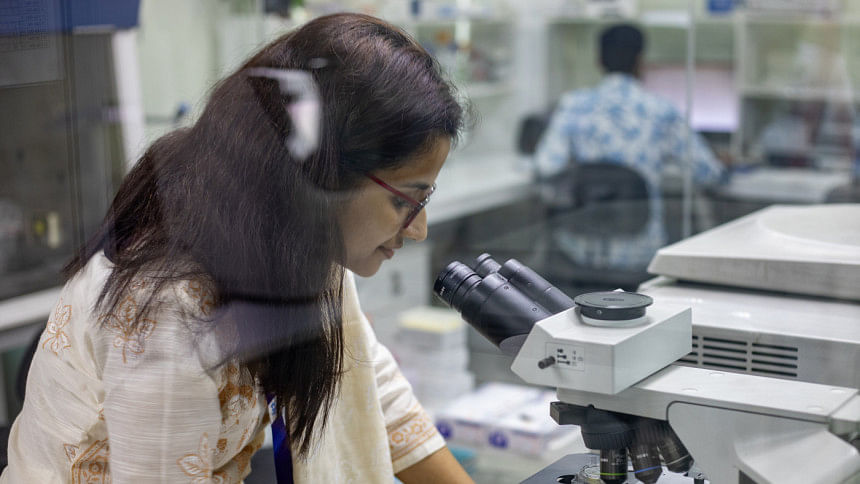The reality of internships for Life Sciences students

By the time your journey as an undergraduate student in a field pertaining to the Life Sciences – that is, your usual suspects of Biochemistry, Microbiology, Zoology, Genetic Engineering, Biotechnology, or any adjacent field – comes to an end, the big question of 'where do we go?' pops up in every students' head.
The question itself can be rather loaded, as Biological Sciences in itself is a rather niche field dedicated almost entirely to research-based work. To that end, many students who wish to continue down this line find themselves facing major setbacks looking for employment or, more preferably, an internship.
For students nearing the end of their degrees, internships come in handy both as a way to connect with scientists currently working in Bangladesh while also allowing them to obtain hands-on knowledge on how lab work is carried out in a professional setting. As such, many students use this as an opportunity to branch out and obtain knowledge from different sources. Sometimes, these internship opportunities may enable the students to learn about more cutting-edge technology that simply isn't available in a university setting.
Fatema Zannat Zerin, a final-year student at North South University, is one such individual according to whom, the scope for internships is very limited. "I recently did a training programme at Child Health Research Foundation (CHRF), which really enabled me to learn a lot more about the field I'm interested in. The frustrating part, though, is that the whole thing was a paid programme," she laments, adding that she wants to move forward with another internship as soon as she graduates, but finds her opportunities to be very limited.
In Bangladesh, perhaps the biggest issue warranting the most discussion is regarding the nature of paid programmes for laboratory-based training or internships. The field of Life Sciences, after all, exists almost entirely within laboratories, working with expensive equipment and chemicals that are not easy to come by. As a result, what students have to face is paying a significant sum just to gain exposure to laboratory spaces and scientists working there.

Aanushka Tupur, a postgraduate student currently at Georgia Tech University, says, "During my internship at CHRF, I was shocked to see how much it cost. It helped me connect to the greater world of science and figure out what my research interests were, but there has to be a better way for students who can't afford such large amounts to also find opportunities."
According to Ahnaf Yeanat Tazwar, a third-year student at North South University, the problem isn't just in the expenses, "Unless you hear anything about these opportunities from a friend, senior, or faculty, you'd have no idea about it. This is because the Life Sciences field is still growing here. So there is no streamlined process in Bangladesh for students to follow."
This brings up the topic of how the Life Sciences is treated in Bangladesh. While it is understandable that Life Sciences in general stands as a rather niche field, demand for it certainly exists, and will continue to grow in order to abet the needs of healthcare research.
Dr Md Kabir Uddin, an assistant professor in the Department of Biochemistry & Microbiology at North South University, says, "There's a huge gap in how much money there is available for research, not just in universities but in organisations and research institutions, and the number of students who are getting into this field. In the last few years, the demand for this field seems to have skyrocketed."
As a result, the situation stands as Life Sciences being in a precarious position. Paid programmes, a lack of direction for students, and a gap in funding and employment, or even internship, opportunities for students all paint a somewhat messy picture. Changes to how Life Science as a field is handled in this country are overdue. But until serious steps are taken, the scenario will remain frustrating for all students who dream of making something out of their degrees.
One hopeful alternative comes in the shape of internships that are offered globally. While these are readily available, they are also highly prestigious and meant for students who have fully dedicated themselves to conducting research in this field.
Naz Afreen, a second-year student at BRAC University, says, "I'm more interested in the clinical side of things, so I applied to some internships in South Korea that were related to this. Unfortunately, I got rejected, but considering how limited my options are over here I thought it was worth a shot."
With cutthroat global competition and a lack of streamlined infrastructure locally, students often find themselves questioning where to go and whether their degrees are even worth it. The reality of the situation points towards the need for the development of systems that can promote these fields and provide support for students looking to make something of their degrees.
The, onus, thus falls on both academia and the industry to work together in order to provide for young researchers looking to integrate and dedicate themselves fully into the world of Life Sciences.

 For all latest news, follow The Daily Star's Google News channel.
For all latest news, follow The Daily Star's Google News channel. 









Comments